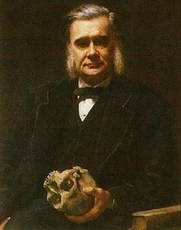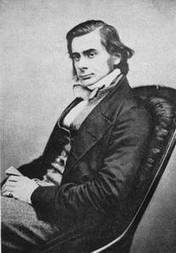Атеизм
Учебка
Портретная галерея
Персоналии
Знаменитые атеисты
FAQ по атеизму
Архив сайта
Обновления
О Сайте
Ссылки
Гостевая книга
Английский зоолог, палеонтолог, эволюционист, путешественник, антрополог, этнограф, просветитель; агностик.
|
"When I reached intellectual maturity, and began to ask myself whether I was an atheist, a theist, or a pantheist; a materialist or an idealist; a Christian or a freethinker, I found that the more I learned and reflected, the less ready was the answer; until at last I came to the conclusion that I had neither art nor part with any of these denominations, except the last. The one thing in which most of these good people were agreed was the one thing in which I differed from them. They were quite sure that they had attained a certain "gnosis" -- had more or less successfully solved the problem of existence; while I was quite sure I had not, and had a pretty strong conviction that the problem was insoluble. And, with Hume and Kant on my side, I could not think myself presumptuous in holding fast by that opinion. [...] So I took thought, and invented what I conceived to be the appropriate title of "agnostic". It came into my head as suggestively antithetic to the "gnostic" of Church history, who professed to know so much about the very things of which I was ignorant; and I took the earliest opportunity of parading it at our Society, to show that I, too, had a tail, like the other foxes". "Agnosticism, in fact, is not a creed, but a method, the essence of which lies in the rigorous application of a single principle. That principle is of great antiquity; it is as old as Socrates; as old as the writer who said, 'Try all things, hold fast by that which is good'; it is the foundation of the Reformation, which simply illustrated the axiom that every man should be able to give a reason for the faith that is in him, it is the great principle of Descartes; it is the fundamental axiom of modern science. Positively the principle may be expressed: In matters of the intellect, follow your reason as far as it will take you, without regard to any other consideration. And negatively: In matters of the intellect, do not pretend that conclusions are certain which are not demonstrated or demonstrable. That I take to be the agnostic faith, which if a man keep whole and undefiled, he shall not be ashamed to look the universe in the face, whatever the future may have in store for him. The results of the working out of the agnostic principle will vary according to individual knowledge and capacity, and according to the general condition of science. That which is unproved today may be proved, by the help of new discoveries, tomorrow. The only negative fixed points will be those negations which flow from the demonstrable limitation of our faculties. And the only obligation accepted is to have the mind always open to conviction". [" Agnosticism", 1889] "That it is wrong for a man to say he is certain of the objective truth of a proposition unless he can provide evidence which logically justifies that certainty. This is what agnosticism asserts and in my opinion, is all that is essential to agnosticism". ["Agnosticism and Christianity", 1889] "Henceforward, I might hope to hear no more of the assertion that we [Agnostics] are necessarily Materialists, Idealists, Atheists, Theists, or any other ists, if experience had led me to think that the proved falsity of a statement was any guarantee against its reputation. And those who appreciate the nature of our position will see, at once, that when Ecclesiasticism declares that we ought to believe this, that, and the other, and are very wicked if we don't, it is impossible for us to give any answer but this: We have not the slightest objection to believe anything you like, if you will give us good grounds for belief; but, if you cannot, we must respectfully refuse, even if that refusal should wreck morality and insure our own damnation several times over. We are quite content to leave that decision to the future. The course of the past has impressed us with the firm conviction that no good ever comes out of falsehood, and we feel warranted in refusing even to experiment in that direction" ["Agnosticism and Christianity", 1889] "I neither affirm nor deny the immortality of man. I see no reason for believing it, but, on the other hand, I have no means of disproving it. I have no a priori objections to the doctrine. No man who has to deal daily and hourly with nature can trouble himself about a priori difficulties. Give me such evidence as would justify me in believing in anything else, and I will believe that. Why should I not? It is not half so wonderful as the conservation of force or the indestructibility of matter..." "It is no use to talk to me of analogies and probabilities. I know what I mean when I say I believe in the law of the inverse squares, and I will not rest my life and my hopes upon weaker convictions..." "That my personality is the surest thing I know may be true. But the attempt to conceive what it is leads me into mere verbal subtleties. I have champed up all that chaff about the ego and the non-ego, noumena and phenomena, and all the rest of it, too often not to know that in attempting even to think of these questions, the human intellect flounders at once out of its depth..." [Из письма к Чарлзу Кингсли.(Charles Kingsley) от 23 сентября 1860 г.] "I have never had the least sympathy with the a priori reasons against orthodoxy, and I have by nature and disposition the greatest possible antipathy to all the atheistic and infidel school. Nevertheless I know that I am, in spite of myself, exactly what the Christian would call, and, so far as I can see, is justified in calling, atheist and infidel. I cannot see one shadow or tittle of evidence that the great unknown underlying the phenomenon of the universe stands to us in the relation of a Father who loves us and cares for us as Christianity asserts. So with regard to the other great Christian dogmas, immortality of soul and future state of rewards and punishments, what possible objection can I—who am compelled perforce to believe in the immortality of what we call Matter and Force, and in a very unmistakable present state of rewards and punishments for our deeds—have to these doctrines? Give me a scintilla of evidence, and I am ready to jump at them". [Из письма к Чарлзу Кингсли.(Charles Kingsley) от 6 мая 1863 г.] "...inclined to think that not far from the invention of fire must rank the invention of doubt" "The only question which a wise man can ask himself is whether a doctrine is true or false. Consequences will take care of themselves." A library of Huxley's writings |


